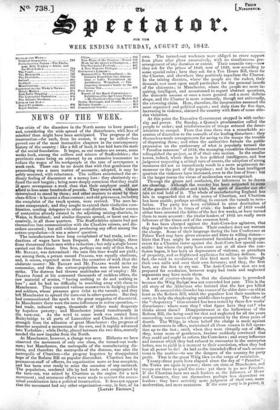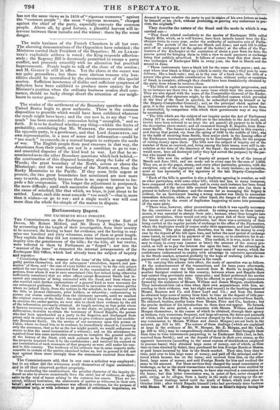NEWS OF THE WEEK.
TEE crisis of the disorders in the North seems to have passed ; and, considering the wide spread of the disturbance, with less of mischief than might have been anticipated. The progress of the insurrection—for such, from its extent, it may be called—has proved one oT the most instructive chapters in the contemporary history of the country : like a fall of land, it has laid bare the state of the social foundation. It began, as our readers are aware, some weeks back, among the colliers and miners of Staffordshire ; the proximate cause being an attempt by an extensive ironmaster to reduce the wages of his workpeople at the rate of sevenpence a ,week each. There can be no doubt that with that gentleman the proceeding was a mere matter of accounts; adopted, it may be safely assumed, with reluctance. The colliers entertained the or- dinary feeling of discontent at a money loss : they obstinately re- fused the new bargain ; being more deeply conscious that they could ill spare sevenpence a week than that their employer could not afford to lose some hundreds of pounds. They struck work. Others -deterrqined to stand by them ; and other masters to stand by their class-fellow : it became a class contest ; and old grievances, including the complaint of the truck system, were revived. The men be- came exasperated; and they sought to extend their vindictive com- bination, sending delegates to other coal-districts. Similar causes of contention already existed in the adjoining mining-districts, in Wales, in Scotland; and similar disputes spread, or burst out suc- cessively, in all those quarters. The Staffordshire miners had put themselves into communication with the Cheshire miners, and dis- orders occurred; but still without producing any effect among the cotton-population—it was a miners' question.
The manufacturers have long complained of bad trade, and re- ductions of wages have been frequent. At Staleybridge, three firms threatened their men with a reduction ; but only a single house carried out the threat. One firm, perhaps one only of that firm, a Mr. BAYLEY, was determined : the men this time would not yield ; one among them, a person named PILLING, was equally obstinate, and, it seems, expected more from the cessation of work than the obdurate master : Mr. BAYLEY and Mr. PILLING would make no concession, and thus the cotton-population was drawn into the strike. The distress had thrown multitudes out of employ : Mr. PILLING found at his command thousands of reckless idlers, the raw material of armies, "having nothing to do and nothing to lose" ; and he had no difficulty in marching away with them to Manchester. They executed various manceuvres in dodging police and soldiers, whose presence gave éclat to the tumult ; and they left Manchester to spread the turn-out in other quarters. - But they had communicated the spark to the great magazine of discontent. In Manchester there were the same influences in active operation,— bad trade, reduced wages, thousabds of idlers made desperate by hopeless poverty; and Manchester joined tumultuously in the turn-out. As the word to cease work was carried from Staleybridge to all parts of Lancashire and Cheshire, it derived strength from the adhesion of great Manchester : the progress of disorder acquired a momentum of its own, and it rapidly advanced into Yorkshire ; while Derby, placed between the two fires, scarcely needed the new impulse from the North.
At Manchester, however, a change was seen. Hitherto we have observed the movement of only one class, the turned-out work- men; but Manchester, the metropolis of the manufacturing dis- tricts, and therefore the metropolis of the distress, was also the metropolis of Chartism—the progeny begotten by disappointed hope of the Reform Bill on popular discomfort. Chartism has its permanent.staff of officers, its organization more or less complete, and has been ever ready to seize the occasion of any outbreak. The population, rendered idle by bad trade and congregated by the turn-out, was seized by Chartists as the engine for a new movement ; and strenuous efforts were made to convert the econo- trucal combination into a political insurrection. It does not appear that the movement had any other organization—any, in fact, of its
own. The turned-out workmen were obliged to crave support from place after place successively, with no simultaneous pre- arrangement of any duration or extent. Their councils vary—now they ask for the prices of 1840, now of 1839, now according to some special rules ; here they ask for a Ten Hours Bill, there for the Charter, and elsewhere they positively repudiate the Charter. In the mining districts, where the people are the rudest, their demands rest most upon small particulars for the personal benefit of the claimants ; in Manchester, where the people are more in- quiring, intelligent, and accustomed to regard abstract questions, the demands assume at once a more general and a more definite shape, and the Charter is more commonly, though not universally, the crowning claim. Here, therefore, the insurrection assumed the most organized and political aspect ; and daily riots for five days, increasing in violence, alarmed the country with fears of some ulte- rior visitation.
At this point the Executive Government stepped in with autho- rity and power. On Sunday, a Queen's proclamation called the people to order ; and reinforcements of troops evinced the deter- mination to compel. From that time there was a remarkable ac- cession of discretion to the councils of the leading disturbers : they themselves made arrangements for saving to the troops the trouble of dispersing them ; and when the authorities forbade the public procession on the anniversary of what is popularly termed the " Peterloo massacre" of 1819, the managing committee themselves relinquished the project, as if of their own motion. In the smaller towns, indeed, where there is less political intelligence, and less judgment respecting a critical turn of events, the adoption of strong measures did not so immediately result in a more acquiescent de- meanour on the part of the populace ; and in the least intelligent quarters the violences have increased, even to the loss of lives : but in the larger towns the virtue of moderation was recognized. Through the gloom and confusion, the inferences to be drawn are cheering. Although the country has been subjected to some of the greatest difficulties and trials, the spirit of disorder can ob- tain no real bold of it. The whole of manufacturing England has lain in unguarded riot at the mercy of Chartism, and Chartism has been unable, perhaps unwilling, to convert the tumult to revo- lution. The party has been exhibited in utter destitution of leaders to direct it in times of crisis : the leaders of 1819 would either have arrested the follies of the last few weeks, or have turned them to more account : the titular leaders of 1842 are really mere followers of the times and of the common herd.
It has been charged against the Anti-Corn-law agitators, that they sought to make it revolution. Their conduct does not warrant the charge. Some of their language during the late Conference at Palace Yard may have given excuses and hints to willing rioters— hints that PEEL might be assassinated furnished a good tu guoque retort for a Chartist rioter against the Anti-Corn-law special con- stable : but where the party have come out at all since the con- fusion began, it has been as deprecators of violence, as preachers of propriety, and as frightened applicanLs for military defence. In fact, the road to revolution of that kind must be made through their own mills and over their own fortunes; and they, the first hurt, are the first to cry out. The Anti-Corn-law men are not prepared for revolution, however angry bad trade and neglected arguments may have made them. A sort of counter-charge is, that the disturbance is provoked because the Whig Budget was not conceded last year. This is the old story of the Alderman who insisted that the last pea killed him. Be assured this disorder has causes of far older date—as old at least as the Reform Bill, which the populace lent their numbers to carry, to help the shopkeeping middle class to power. The value of the " shopocracy " thus created has been tested by these few weeks' disturbance : where were they ? what figure have they cut ? who thinks about them ? Disappointment at the hollowness of the Reform Bill, the being used for that and neglected for all the years succeeding, were causes of anger exasperated by the three years of dearth. " The Whigs, in whose behalf the charge is made against their successors in office, maintained all those causes in full opera- tion up to the last ; until, when they were virtually out of office, they, some score of gentlemen, became suddenly convinced that they could and ought to reform the Corn-laws ; and every influence and interest which they had refused to encounter in the enterprise before, was to yield in a moment to their conviction, when they had lost all power to do ! As bad as the intended effect of such accusa- tions is the motive—to use the dangers of the country for party profit. That is the great Whig idea on the verge of revolution.
Twenty-three years have elapsed since the day of " Peterloo ": the Tories are again in power; there are riots at Manchester, and troops are there to quell the riots : yet there is no new Peterloo. If the Chartists have not such leaders as the followers of Hera and COBBETT, they are themselves perhaps less dependent on leaders : they have certainly more judgment of their own, more moderation, and more acuteness. If the same party is in power, has not the same views as in 1819 of " vigorous measures" against the "common people " : the most "vigorous measure," charged against the chief of the party, especially exempts the common people. Above all, by good fortune, a plentiful harvest will in- tervene between these tumults and the winter : there lay the worst danger.



























 Previous page
Previous page